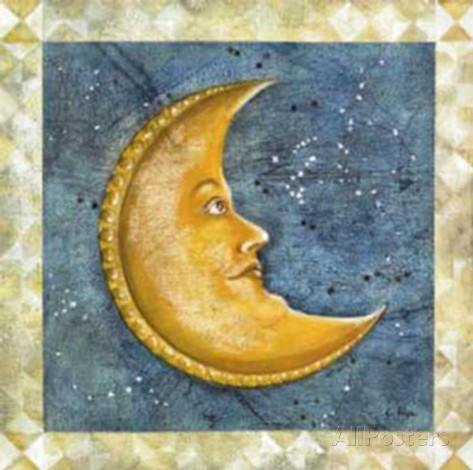 The Moon (to react to)
The Moon (to react to)
The Planet Of Needs And Feelings- feelings
- reflection
- change (rhythmical), fluctuation
- take in
- need
This gives us the clue that the moon is concerned with our inbuilt responses to things, and suggests the importance of our past experience and habits and learning in how we do things. How we react depends on our past learning and on our past experiences. We react without thinking, and we do what we have been trained to do, either through education or through traumatic experiences. The type of learning associated with the moon is unconscious and refers to early learning and upbringing over which we had little choice or awareness. Basic and instinctive responses are related to survival and thus to our needs.
The Moon is concerned with memory, imagination and dreams. The Moon tends to give a good memory, and imaginative ability. It also brings regular dreams, and dreams such as longings and sentimental desires. While Uranus may be concerned with intellectual dreams of a better more humanitarian future, the Moon's dreams are more emotionally based.
The Moon rules Cancer.
The moon is also associated with security, because our automatic reactions are often related to survival and hence security.The House and Sign where the Moon is found is where we feel most comfortable, and indicates what we do to feel good, or what we do habitually ... what we need to do. Contrasted with the sun, which indicates what we should do to attain our life purpose, and with Saturn which indicates what we must do.
The Moon is feminine and governs growth and decay, as it governs the ebbing and flowing of the tides. And as it shows in its waxing and waning and in its periodic action. The moons natural sign is Cancer, and its natural house is the fourth. Its keyword "react to" implies change, and change in relation to other events.
 Water is her element. Her nature is cold and moist. She rules Cancer and she is in exaltation in Taurus. She is in analogy with the stomach.
Water is her element. Her nature is cold and moist. She rules Cancer and she is in exaltation in Taurus. She is in analogy with the stomach. She represents the mother, the wife and the crowd. Her age covers the period from birth to childhood before puberty, or even earlier, according to some authors.
Temperament: phlegmatic.
Characterology: emotive, non-active, primary, or non-emotive, non-active and primary. She is nervous, or amorphous.
She is complementary to the Sun in the sense that she represents the feminine part of the personality (the Yin), the unconscious, the emotions and the sensitivity of the chart's owner. She symbolizes all feminine figures such as the mother, the wife, etc.
She is a sign of fertility, femininity, imagination and memory, or lack of, depending on the aspects she receives. She is particularly important in a woman's chart because she is believed to express more or less easily her female status and her femininity.
In a man's chart, although the Moon represents his sensitivity, she may be of a lesser importance, since she is often repressed. In addition, she symbolizes the chart owner's mother, and later on, his wife as well as his representation of the ideal woman.
The Moon is the night star. Therefore, she is associated with dreams, the unconscious, subjectivity, moods, the past, nostalgia, but also with laziness, nonchalance and whims. Besides, she is of utmost importance for children, because they have not yet learnt to master their primary instincts, and remain very attached to their mother.
Correspondences: Opal, moonstone, pearl, all soft stones; silver, aluminum; melons,
pumpkin, mushrooms, watercress, lettuce, willows; opalescent & iridescent colors, silver,
gray, white, yellowish-white; shellfish, frogs, ducks, owl, cow, horse, snails, tortoise, mouse;
Monday; irregular curves, crooked lines; insipid and odorless flavors; midwife, nurse,
gynecologist, obstetrician, governess, fishermen, purveyors of food, dealers in liquids,
advertising, estate agents, baker; breasts, pancreas, digestive & lymphatic systems,
sympathetic nervous system, female reproductive system; diabetes, hypoglycemia, bladder
and kidney disorders, asthma, carcinoma; the first four years of life.
Astronomy: The Moon is so large that it is considered by astronomers as not a moon but a
second planet, the Earth and Moon orbit around a common center; the Moon revolves
around this center every 27« days, and causes the tides of the oceans.
Principles: Fertility, Yin, mother, female, receptive, cyclicity, rhythms, night, depths,
unconscious, subconscious, habits, defenses, instincts, the womb, gestation, actuation,
change, development, adaptation, self-preservation, sustenance, union, surrender, nature.
Actions: Parenting, protecting, defending, nurturing, watering, adapting, withdrawing,
possessing, containing, supporting, receiving, softening, flowing, fluctuating, bonding,
holding, creating, animating, domesticating, nesting, romanticizing, remembering, affiliating,
introspecting, emoting, fantasizing, dreaming, bringing things to fruition.
The Gifts of Moon: The deepest love, with complete selflessness and openness. An instinctive
and spiritual connection with Mother Nature and Goddesses. An awareness of the Sacred
rhythm to life, and the music within it. The ability to relinquish control, to surrender and
become the vessel for a Higher Source. The awareness of exactly what is needed in a
situation, and the instinct to fulfill it.
The lessons Moon has to learn: To bring to consciousness what is hidden to self. To sort out
one's own feelings from others. To live in the present, instead of the past or fantasy. To
witness self in present time, especially when agitated. To let go of others, and objects, when
it's time. To "teach others to fish" instead of fostering dependency.










0 comments:
Post a Comment